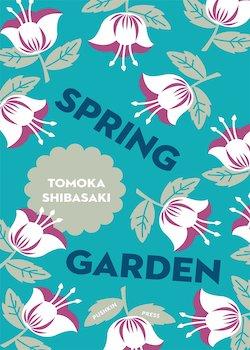Spring Garden: Loss, friendship and architecture

By Shibasaki Tomoka
Translated by Polly Barton
Pushkin Press, 2017
ISBN: 978-1782272700
Review by Eluned Gramich
Spring Garden is the second novel by Osaka-born Shibasaki Tomoka, having had her debut, A Day on the Planet, adapted into a successful film in Japan. This new book has also garnered the young author great acclaim, earning her the national Akutagawa Prize in 2014. Beautifully and subtly translated by Polly Barton, Spring Garden centres on twenty-something Taro. Recently divorced after a short-lived marriage and still reeling from the death of his father, Taro lives on his own in a one-bed flat in a condemned apartment block. The story follows him and his two neighbours who remain in the emptying building; the ones left behind, without much in the way of family. The unusual friendship that unfolds between Taro and Nishi, the woman from the top floor, leads him to surprising discoveries about his neighbourhood. She spends her time spying on the magnificent family house opposite their concrete block of flats. After discovering a coffee-table architecture book featuring the house called Spring Garden – reminiscent of an art and lifestyle magazine – which she shows Taro, the two of them become fixated on the building’s sky-blue walls, décor, gardens and, eventually, even the family who move in. ‘Spring Garden’ becomes a symbol of everything that the two wish for in life: style, space, independence, wealth, comfort and, most important of all, companionship.
The interest in urban living and the narratives that arise from so many strangers living in close proximity is not new, especially for contemporary literature set in Tokyo. However, Shibasaki succeeds in creating a unique atmosphere, poised between mystery and sympathy, violence and kindness. It isn’t just a story of loneliness in a big city; rather, Shibasaki shifts the focus onto the aesthetics of living, and the important relationships that may form by way of art and architecture. Although the novel takes place in a very real, specific place – Setagaya, a middle-class suburb of Tokyo – it is also a dream world. Both Nishi and Taro are big dreamers, walking the world with their head in the clouds, and this is partly what makes them such sympathetic characters. Taro, in his laziness and lack of ambition, spends most of his time dozing in his flat, reflecting and wondering; Nishi is an anime artist and lives through, and by, her imagination, which includes her passion for the blue-walled house next door and all that it represents. In some ways it’s a modern story for an instagram-age. Like Kinfolk magazine, ‘Spring Garden’ shows off the seemingly ‘better’ life of an artist couple: a woman doing yoga within perfectly decorated rooms, a man digging in an enviable garden. Nishi clings to the book like a bible: it doesn’t matter that these images don’t reflect the complex and unhappy episodes of the couple’s actual life.
Shibasaki’s writing is measured, understated and poetic at the right moments. The language comes alive as she hones in on the grotesque details of plants and animals, the details of a potter’s wasp and Japanese snowbell, for instance. Taro’s grief at losing his father is portrayed in physical, tangible terms: he grinds his father’s remains in a pestle and mortar so that they are fine enough to scatter, leaving traces of his father’s body in his kitchen. The way that Shibasaki pulls together the threads of Taro’s family life and colleagues without turning the focus away from the condemned building is deftly done, deepening a reader’s sympathy with him and making the novel difficult to put down.
When a new family with young children move into Spring Garden, Nishi befriends them and pulls Taro into the circle too. The events of the novel reach a fraught climax with the apartment block about to be demolished, and Taro forced into making decisions about the future that he has spent years avoiding. Spring Garden is a brief, compassionate tale about loss, friendship and architecture, and the many ways we can live our lives.

